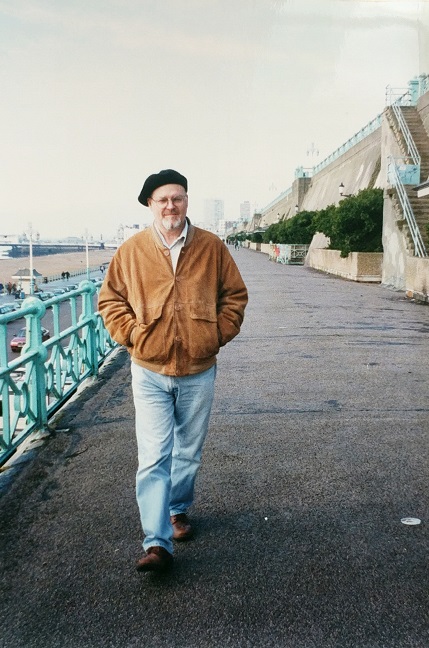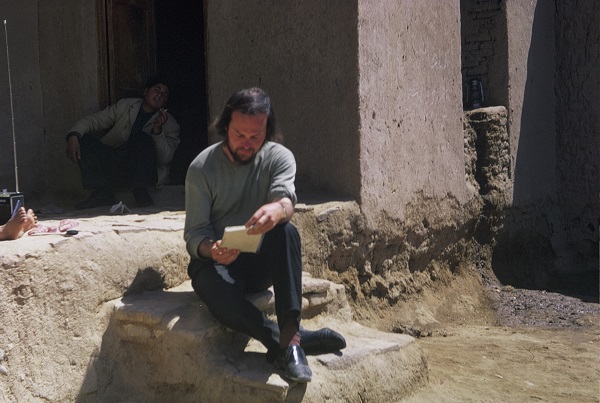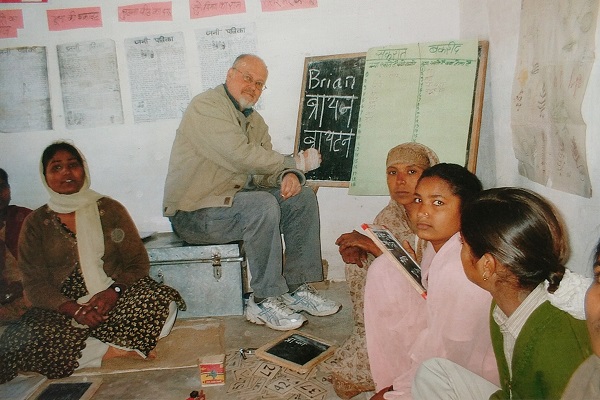Brian Street, 1943-2017
Brian Street, who has died aged 73, was a Professor Emeritus of Language and Literacy at King’s College London who challenged establishment ideas of literacy and education and questioned the idea that people living in conditions of poverty are illiterate. With his seminal idea of literacy as a social practice he helped found the field of New Literacy Studies and influenced policy approaches to education internationally, working with agencies like DFID and UNESCO, and supporting grassroots organisations in India, Ethiopia, Uganda, and South Africa with the development of local initiatives that sought to understand and build on local literacy practices, rather than courier in ‘one-size fits all’ models from elsewhere.
Brian was born in Manchester in 1943 to Dorothy Groves, a young woman from a Russian Jewish refugee family, and was told his deceased father was an Irish Battle of Britain pilot who had perished in the War. He was placed in a convent orphanage, from where he was adopted by his mother and father, Margaret Nellie Street and Harry Street. In 1945 the family relocated to Buckfast in Devon, where Harry found work in the local wool factory. It was while working in the same factory that Brian had a terrible accident aged 18, when a hook separated from a bale of wool and drove into his left eye, leading to its near loss and permanent damage to the cornea.
Thanks to his mother, who cut an advert for a newly established independent college in Oxford out of the newspaper and brought it to his hospital bed, Brian left the post-war council housing where he grew up at 19 and joined around 50 other students at Buckland University Hall, an experimental co-educational college established by a wealthy Oxford Don. His mother had long held educational aspirations for her son, working night shifts at a local pottery for many years to help pay Brian’s fees at the Christian Brothers Grammar School in nearby Plymouth. Buckland Manor was a rambling country house, later bought by the Candy Brothers, and here Brian used the money he had saved working in an ice-cream van over the summer to buy his first car and explored the Oxfordshire countryside with a new family of friends, many of whom, including anthropologists André Singer and Hilary Callan and the educationalist Magnus John, he would keep close throughout his life and career.
The English literature degree he obtained there was a stepping stone to the University of Oxford, where he began a post-graduate diploma in Anthropology in 1964, progressing to a PhD under the tutelage of Godfrey Lienhardt, whose field research on the religious life of the Dinka in Sudan had been a milestone in the anthropology of religion, and who remained an important mentor and father figure until his death in 1993. The PhD brought together Brian’s love of literature and growing interest in anthropology to explore anthropological influences on European colonial novelists of the 19th Century. The resulting book, The Savage in Literature, which was published in 1974, was in many ways ahead of its time, prefiguring the ideas of Edward Said on Orientalism that became so popular in the 1980s, and was reprinted by Routledge in 2016.
So began a life of travel and enquiry that would result in the publication of more than 30 authored, co-authored or edited collections and over 150 articles or book chapters. Brian never lost his interest in the written word, and when he undertook fieldwork in a mountain village outside Mashhad in Iran in 1970, he became fascinated by the relationships between writing practices employed in everyday trading relationships, Islamic madrasas, and a new formal government schooling system. This research led to the publication of Literacy in Theory and Practice (LITP) in 1984, a book that challenged the prevailing orthodoxy that a great divide existed between literate and oral societies. The book argued that the communities that international agencies and the media portray as living in a state of illiterate ignorance in fact feature a rich tapestry of reading and writing practices that are deeply embedded in everyday relationships and social structures. External agencies are blinded to these practices by their own ‘ideological models’ of what counts as literacy. The lack of local engagement is also the reason that so many technical skills-based approaches to education and development fail. These ideas reflected Brian’s deep commitment to egalitarianism and his unerring belief that everyone, from any educational background, nationality, or class has something to say that is worth listening to.
Over the next 40 years, Brian fought for the acceptance of these ideas in academia and practice. With colleagues at the British Association for Literacy in Development, of which he later became President, he helped establish the LETTER project, which worked with community organisations in India and Ethiopia to develop educational materials based on local literacy practices. LITP has over 6000 citations and has influenced anthropological approaches to education and educational policy around the world.
In 1974 Brian took up a position as lecturer in anthropology at the University of Sussex, where he met Joanna Lowry, his first wife and mother of his three children, Chloe, Alice and Nicholas. They separated in 1991 but, in keeping with Brian’s genial character and convivial approach to life, remained longstanding family friends. In 1996, Brian took up a Professorship of Language and Education at King’s College London, and launched the weekly Research Workshop in Language and Literacy where, with colleagues and visiting academics from around the world, he helped to establish the burgeoning field of New Literacy Studies.
Brian saw life as one long seminar that stretched from London to the University of Pennsylvania, where he took up a visiting Professorship in 1988 and ran regular summer schools until shortly before his death, to the Universidade Federal de Minas Gerai in Belo Horizonte in Brazil, where he met his second wife and great love, Maria Lucia Castanheira. Brian never saw the need to separate love, friendship and work and he and Lalu, as he knew her, combined all three, collaborating closely in new research on experiences of indigenous students in Brazil’s mainstream university system, co-authoring articles, and enjoying an international romance that took in conferences and talks in Mexico, the USA, South Africa, and the UK.
Despite receiving international acclaim for his work, including the award of the Distinguished Scholar Lifetime Achievement Award by the National Reading Council in the USA, admission to the Reading Hall of Fame by the International Literacy Association, and an Honorary Degree at the Open University – which will be collected posthumously by his family – Brian never took on the mantle of academic superiority. For many years he gave up his Saturdays to teach King’s College widening participation classes to secondary school students from inner-city schools. As the longstanding Chair of the Royal Anthropological Institute Education Committee, he worked tirelessly to bring anthropology to a wider audience of students through the development of the anthropology A Level, which was launched in 2010 (the A Level was subsequently shut down in 2015 when the Education Secretary, Michael Gove, introduced traditionalist reforms to the A Level system). Brian saw his greatest claim to success as the more than forty PhD students that he supervised through to completion, many of who have taken his ideas forward into new research terrains. When Brian’s youngest daughter visited him in hospital in late 2015, his main concern was that she find his friend and local big issue seller, Tony, to explain why he had not bought the magazine that week.
Brian’s modest beginnings, coupled with his experience of adoption, might have given rise to a sense of displacement and alienation from middle-class British society. In Brian, instead, these early experiences helped form a great sense of potential kinship with others, and a resolute belief that he, and anyone else, could belong anywhere. His own luck and good fortune was something he deeply appreciated and he sought to share it with everyone he met.

Brian (circa 2000) on the Brighton seafront

Brian (circa 1970) in Zoosk, Iran

Brian (circa 2006) in India with BALID
ALICE STREET
To cite this article:
STREET, ALICE. 2017 ‘Brian Street, 1943-2017’. Obituaries. Royal Anthropological Institute, July 2017. (available on-line: https://therai.org.uk/archives-and-manuscripts/obituaries/brian-street)
Related:
MAYBIN, JANET. 2017 ‘Brian Street, 1943-2017’. Obituaries. Royal Anthropological Institute, July 2017. (available on-line: https://therai.org.uk/archives-and-manuscripts/obituaries/brian-street-1943-2017)
SINGER, ANDRE. 2017. Professor Brian V. Street. Anthropology Today 33, 4: 23.
Link to relevant records by or concerning the listed person on the RAI’s bibliographic database Anthropological Index Online https://aio.therai.org.uk/aio.php?action=doadvancedsearch&filter=*&cw=OR&as_method=get&as_resultsmode=fullkeywords&f0=author&o0=%3D%3D&v0=Brian%20Street&f1=author&o1=%3D%3D&v1=B%20Street
